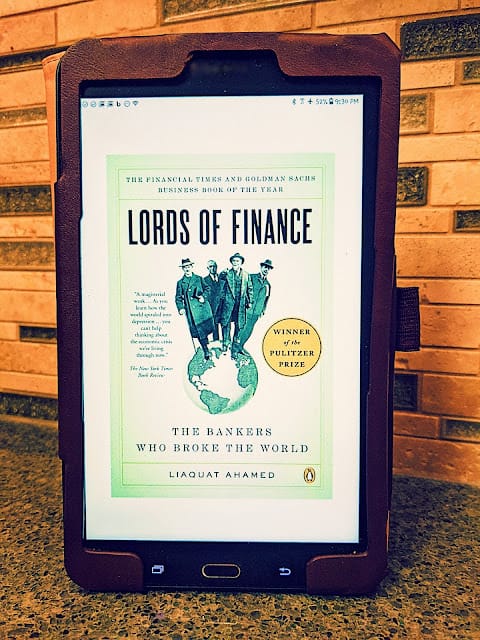
This is the tenth of my Monday Memories series of posts. In these posts, I pull a book off my shelf, somewhat randomly, and tell you a bit about it. It’s not a review of the book so much as a memory of the book, a bit about what might have been going on in my life when I read it, and my thoughts on who might like this book.
The Book
Lords of Finance: The Bankers Who Broke The World, by Liaquat Ahamed. Copyright 2009 by Liaquat Ahamed. Published by the Penguin Group. Kindle Edition.
Why This Book?
I am pretty agnostic as to the format of the books I read. I know there are people who have strong preferences for printed books, or for ebooks or even (gasp!) audiobooks, but I’m not really one of them. I think the format of a particular book needs to match my interest in the book and what’s going on in my life at the point I get the book.
So, for example, if I’m really busy in a given week, I might download an audiobook from the library and multitask while listening to it. I can do work around the house or yard, drive, exercise, etc., and still get a good book in. If I get distracted I can skip back in the audiobook or just stop listening for a bit, and then come back to it. I find audiobooks are ideal if you are on the go and still want to read.
But I still love paper books, as you could easily tell if you stepped through our front door. One wall of the house, from front to back, is lined with bookshelves, and I keep buying more books to stuff into them! I tend to prefer paperbacks (trade sized) over hardcover. However, if I am eager to get a book that just came out (which happens more often than not) I’ll spring for the hardcover. Looking at my bookcases, it’s probably 60% paperback, 40% hardcover.
A lot of the books I check out from the library tend to be ebooks. Especially during the pandemic, it’s just been really easy to find reading material from the local library on Libby or the Overdrive app. I do also buy ebooks, and generally they tend to be books I’ll read while traveling. I have to admit though, that I’ve been guilty of buying an ebook to read on a plane, and then stopping by the airport bookstore and also picking up a paper book…
So, all of this rambling leads me to why this book – this week’s book is the very first book I bought on a Kindle.
What’s This Book About?
Central bankers, and the role they played in causing the economic meltdown that was the Great Depression.
Ahamed makes the case that the monetary theories and national interests of the day, and the actions taken by central banks based on those theories and interests, were key triggers for, and worsened the impact of, what became the Great Depression.
Ahamed focuses on the central banks of the US, Britain, France and Germany. Starting from their actions in WWI, he tells the story of German reparations, the Gold Standard, a bubble in the US Stock Market, and of these central bankers reactions to them.
What Was Going On In My Life When I Read This?
Well, for one thing, this book came out in 2009 as the world was still wrestling with the impacts of the Great Recession and it was a very timely read. The real estate market in the US took a sharp decline between 2007 and 2009, with economic impacts in the US second only to the Great Depression. Many homes, including ours, suffered a sharp drop in value, but, we were fortunate enough to not have been “under water” with a mortgage, or to have suffered a job loss like many others did.
I bought this book to read on a trip that summer on my brand new Kindle 2. I like to think I’m an early adopter of technology, but the original Kindle, though tempting, just struck me as too expensive. I did fall for the Kindle 2 though, even though it was very expensive by today’s standards,and was happy I did. I’ve since owned a Kindle Fire and a two Kindle Paperwhites (and use the Kindle app on my tablet, as pictured above), but that Kindle 2 kicked around between my husband and I until just last year when we finally retired it.

Why Would Someone Like This Book?
If you have any interest in economic history, this is probably one of the most readable and worthwhile such books I’ve read. It has an overall rating of 4.02 stars with over 13,000 reviews on Goodreads.
So that’s my “Monday Memories” book post for this week. Are you a reader of ebooks? What was your first Kindle book? Leave a comment below.